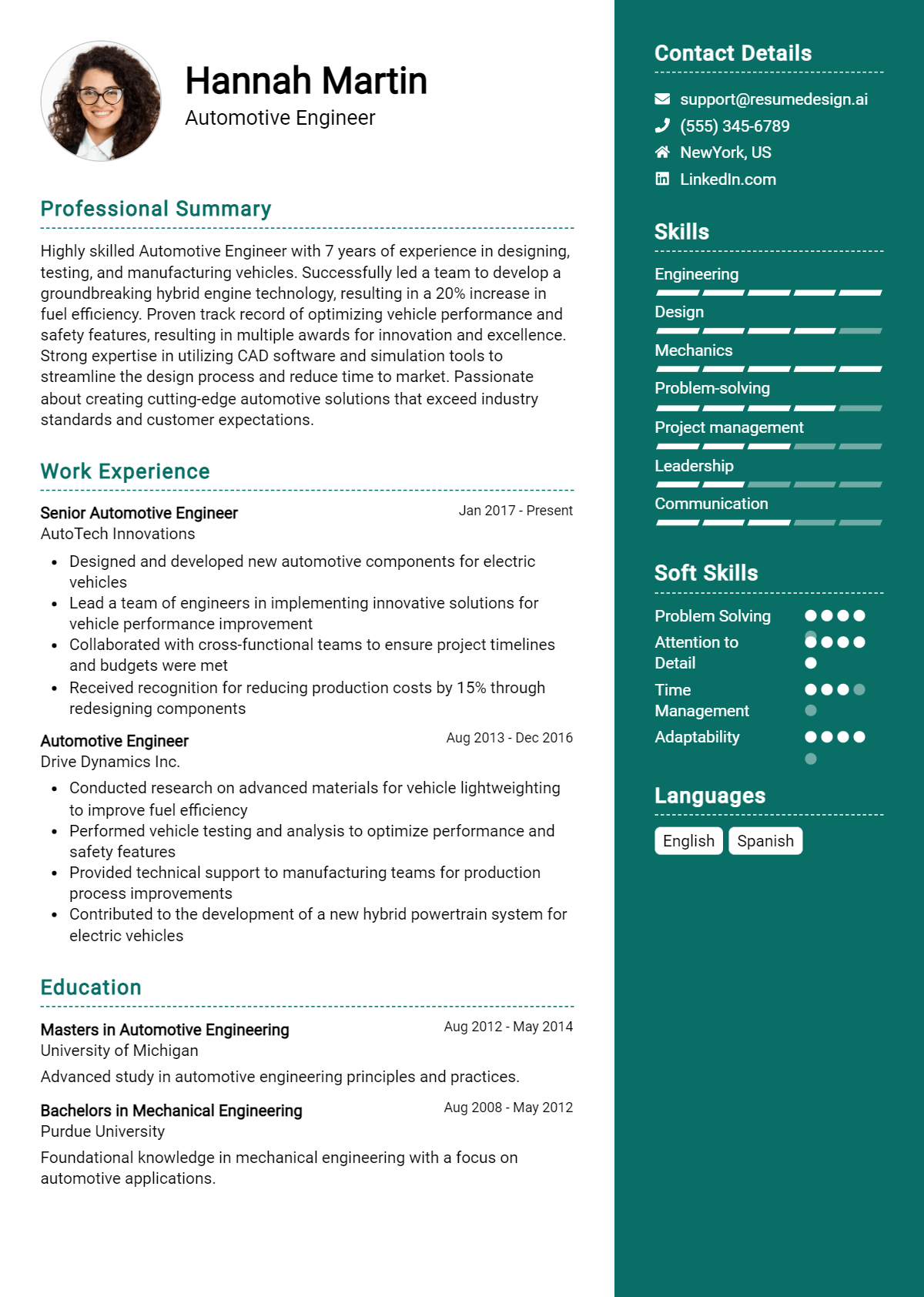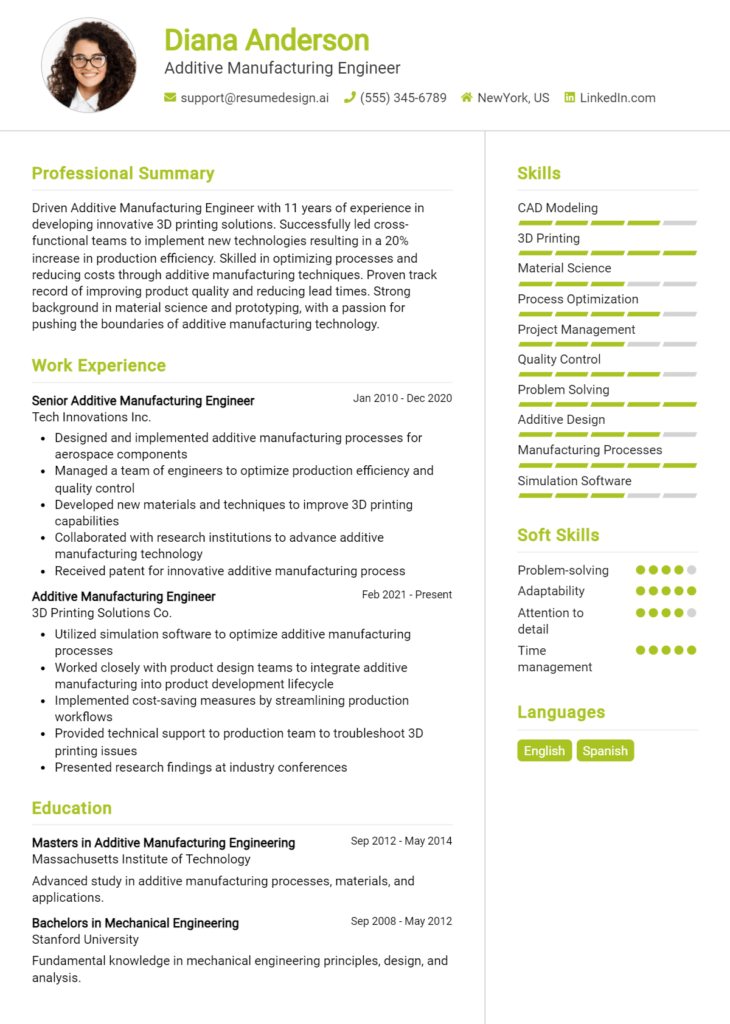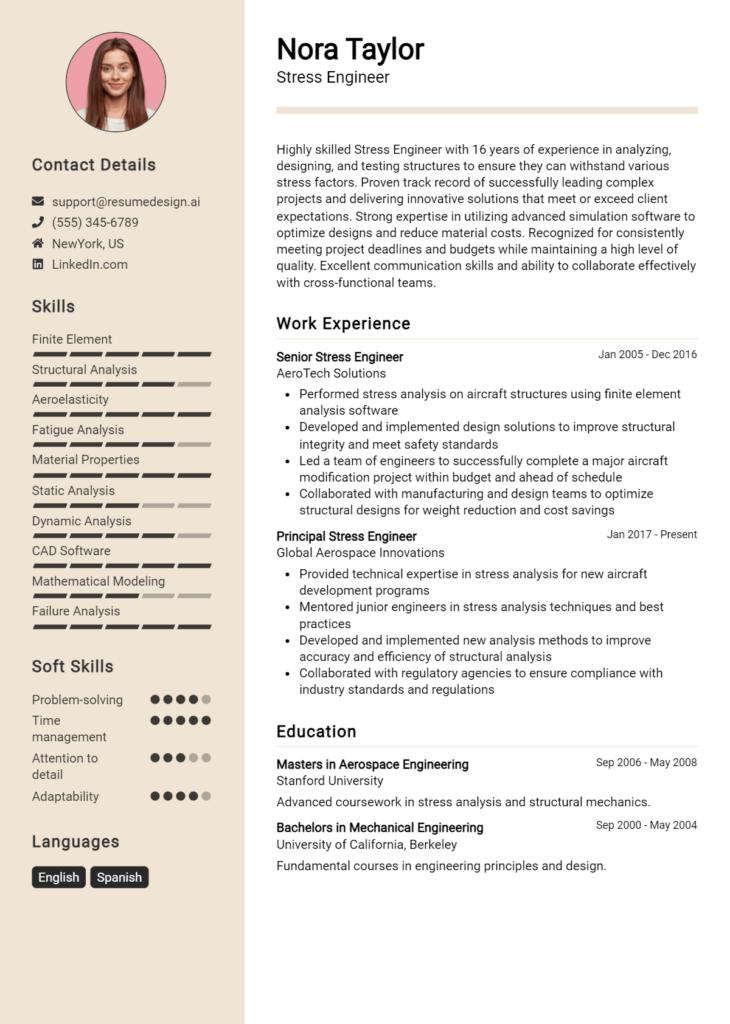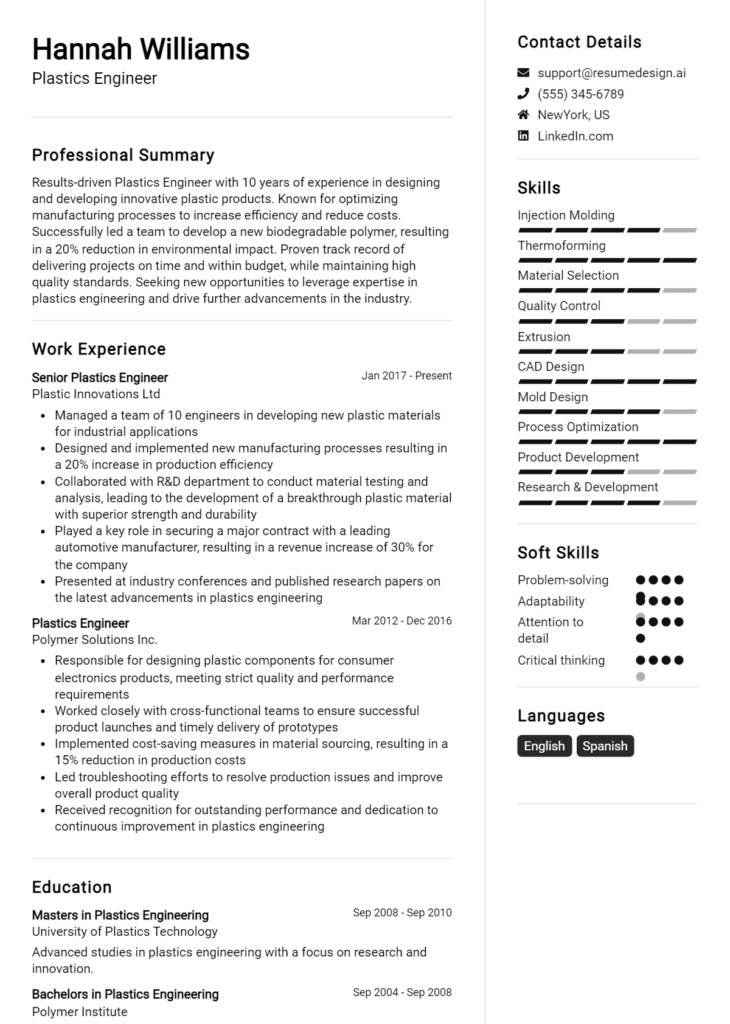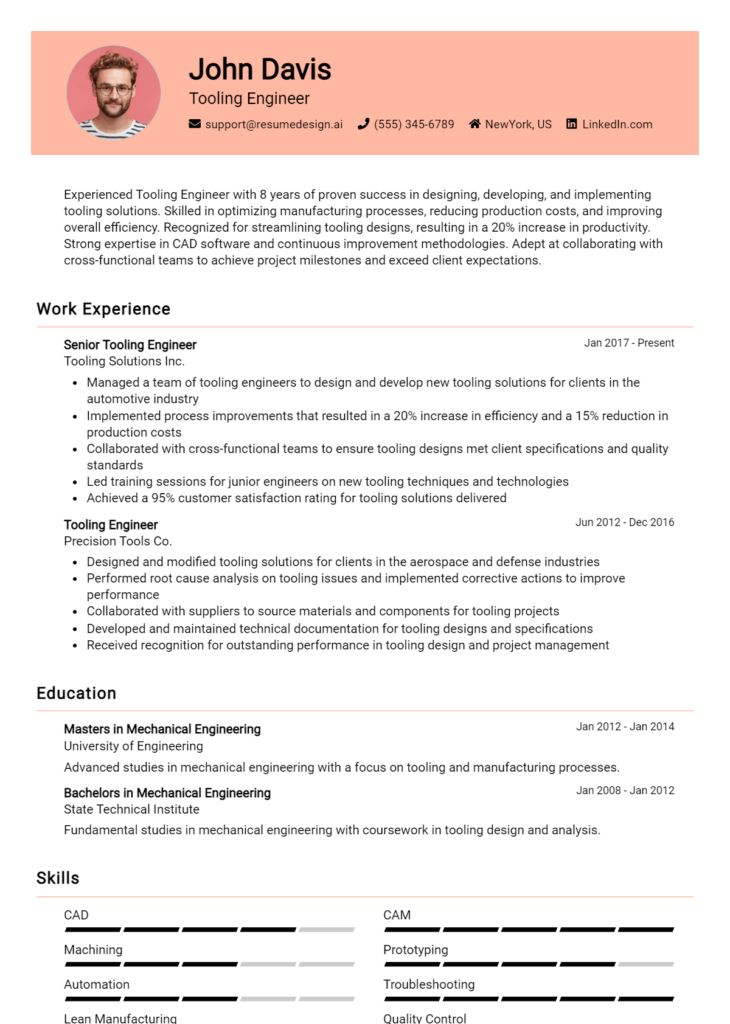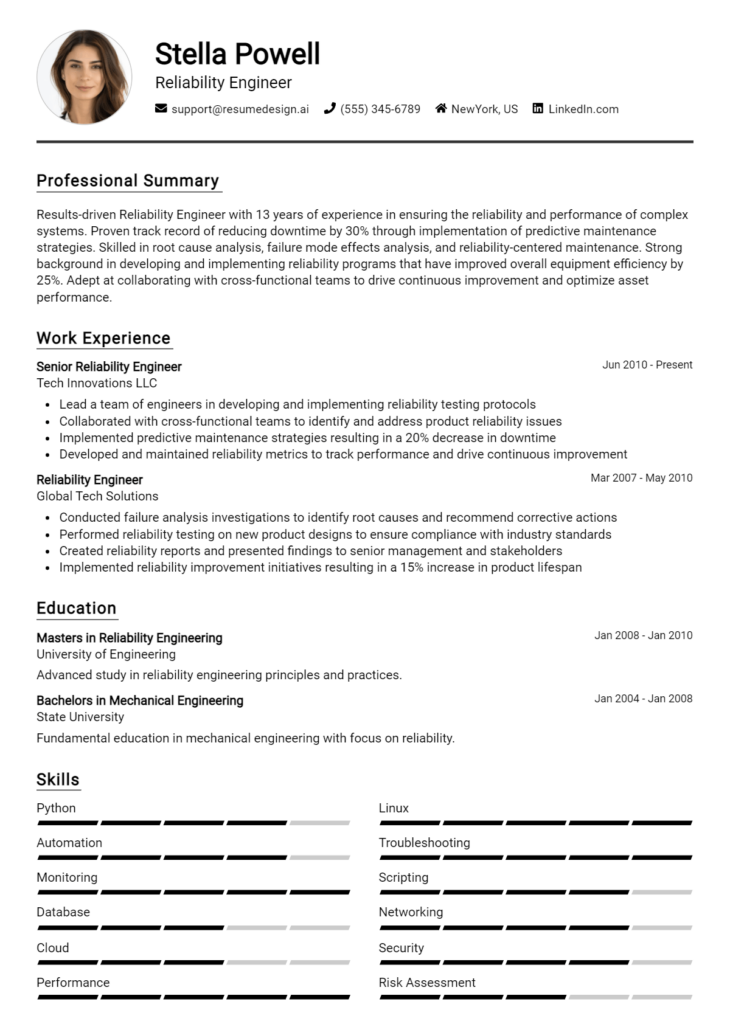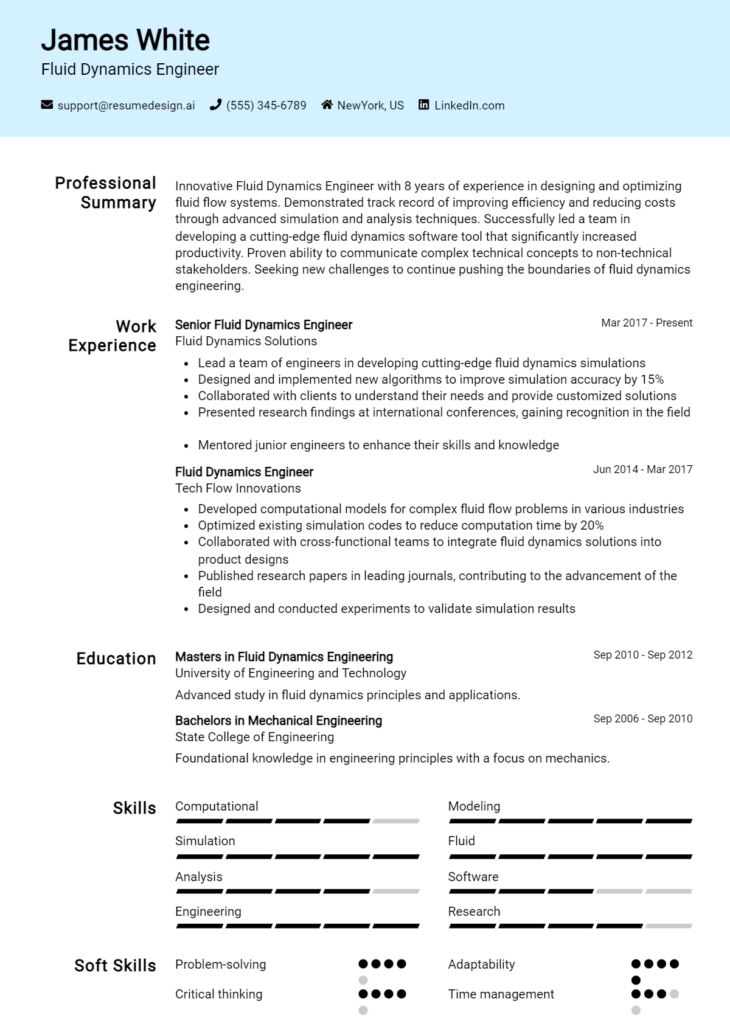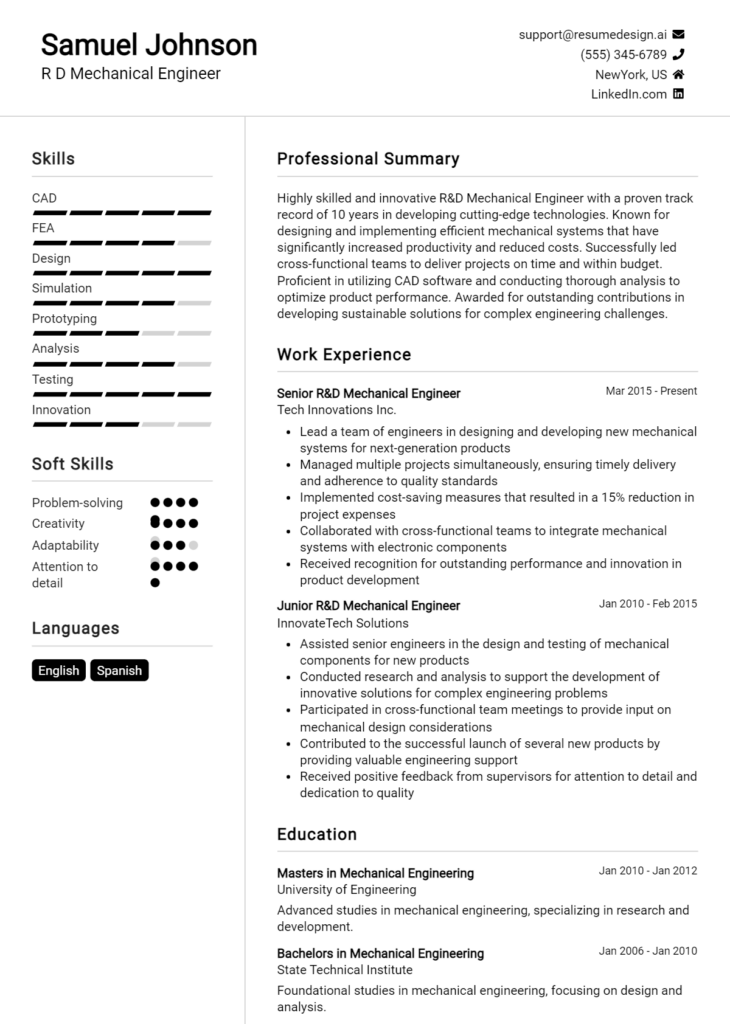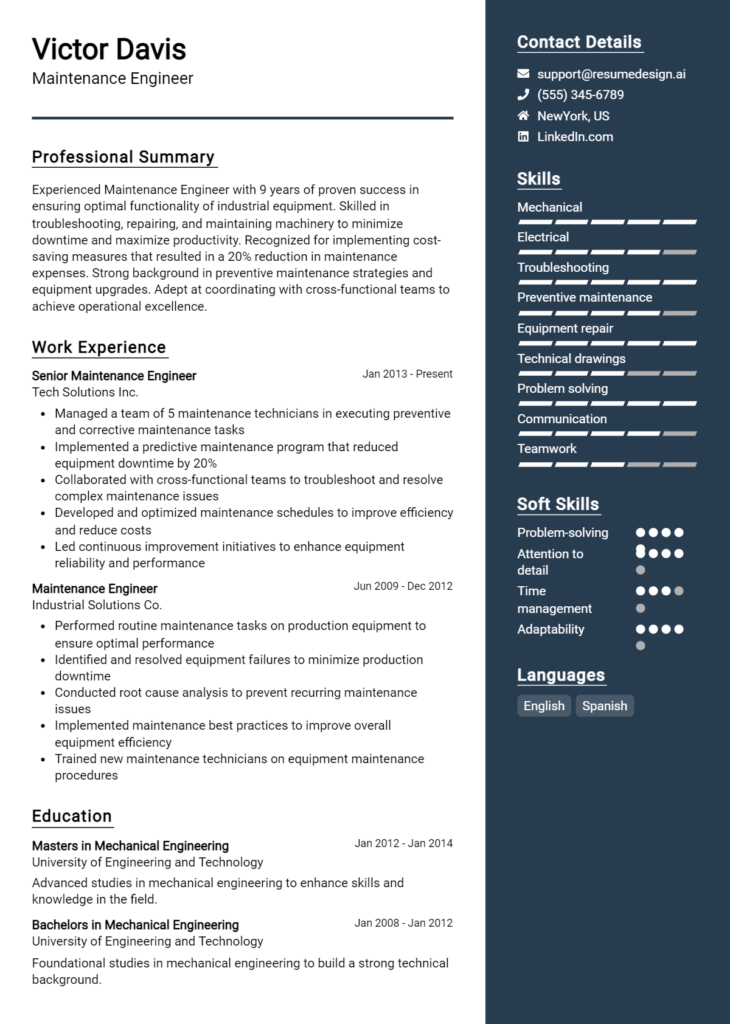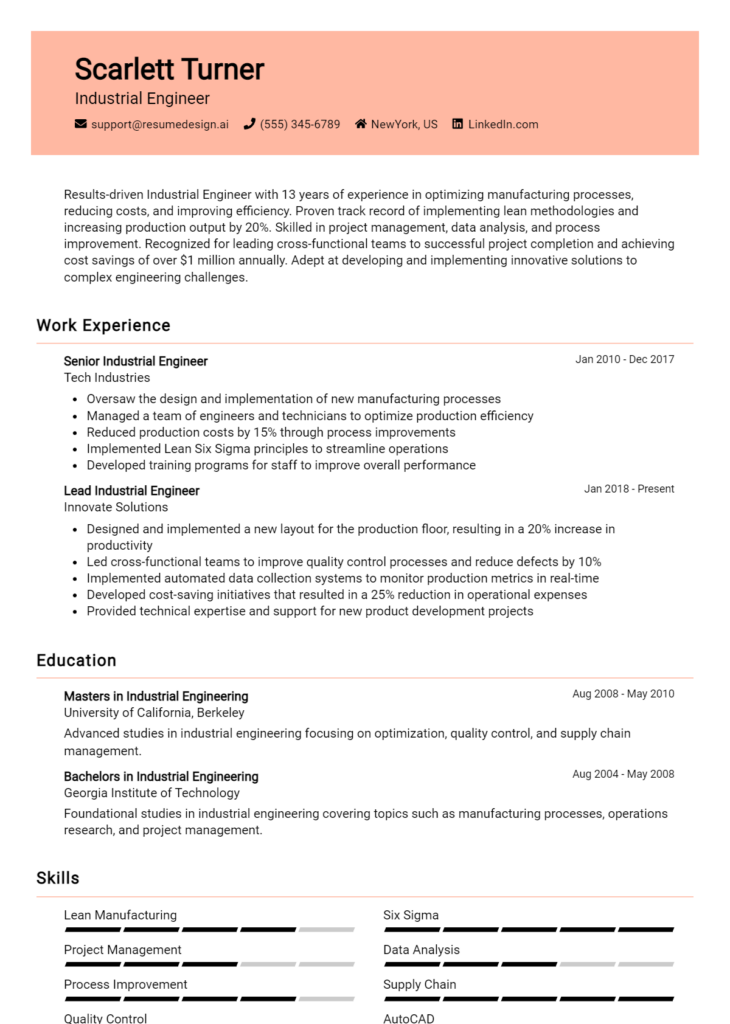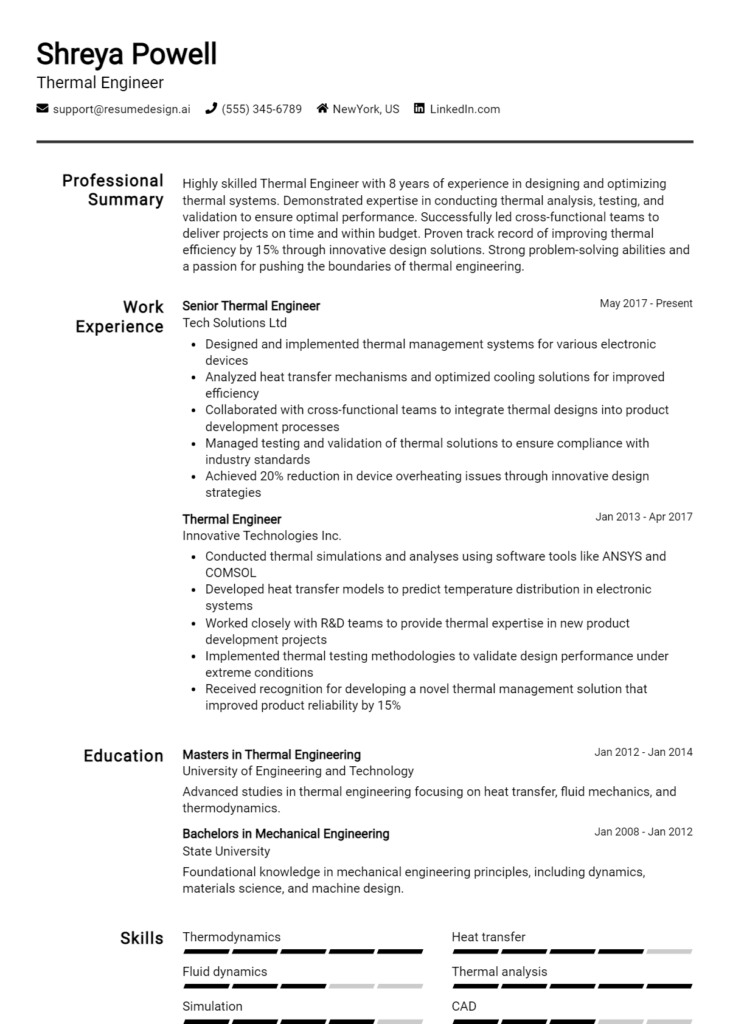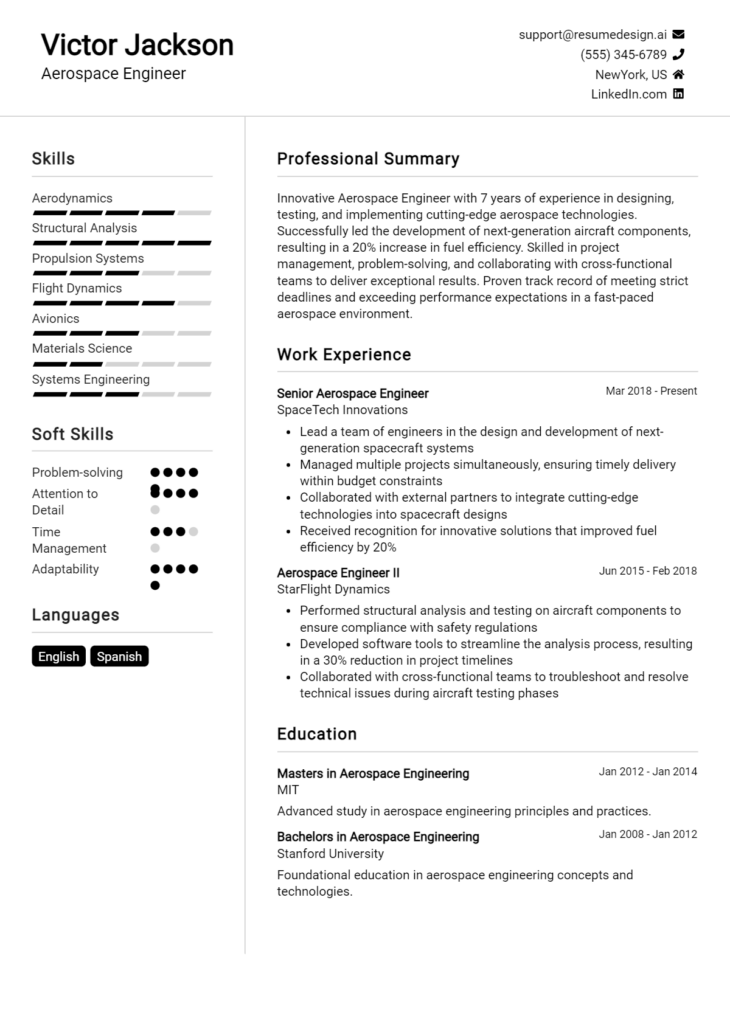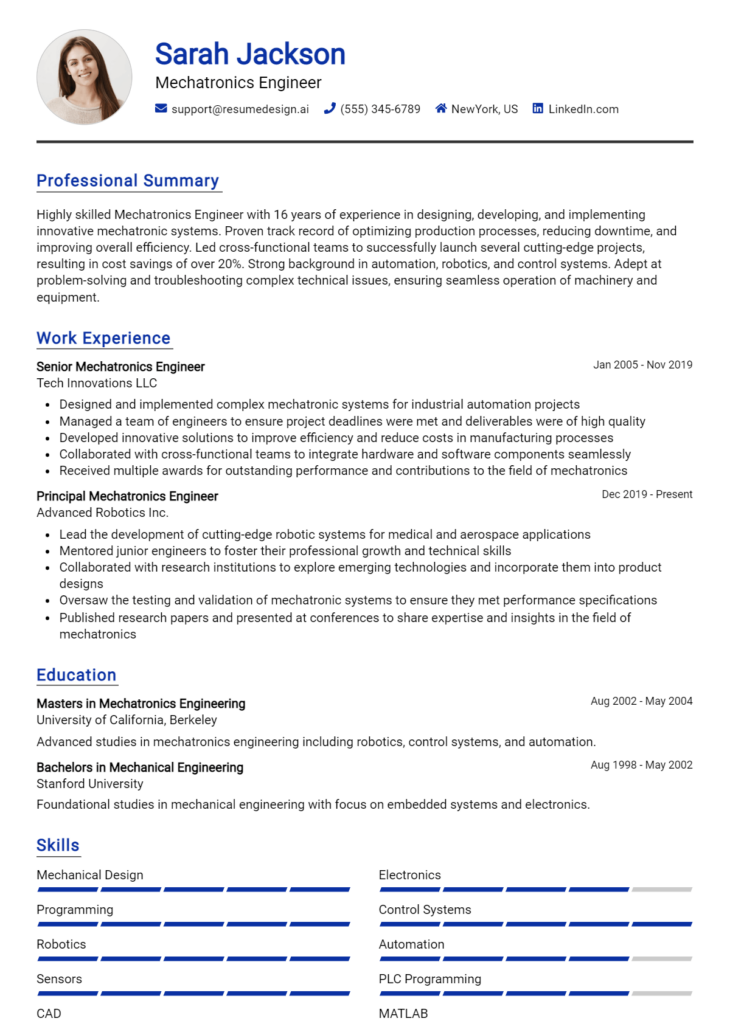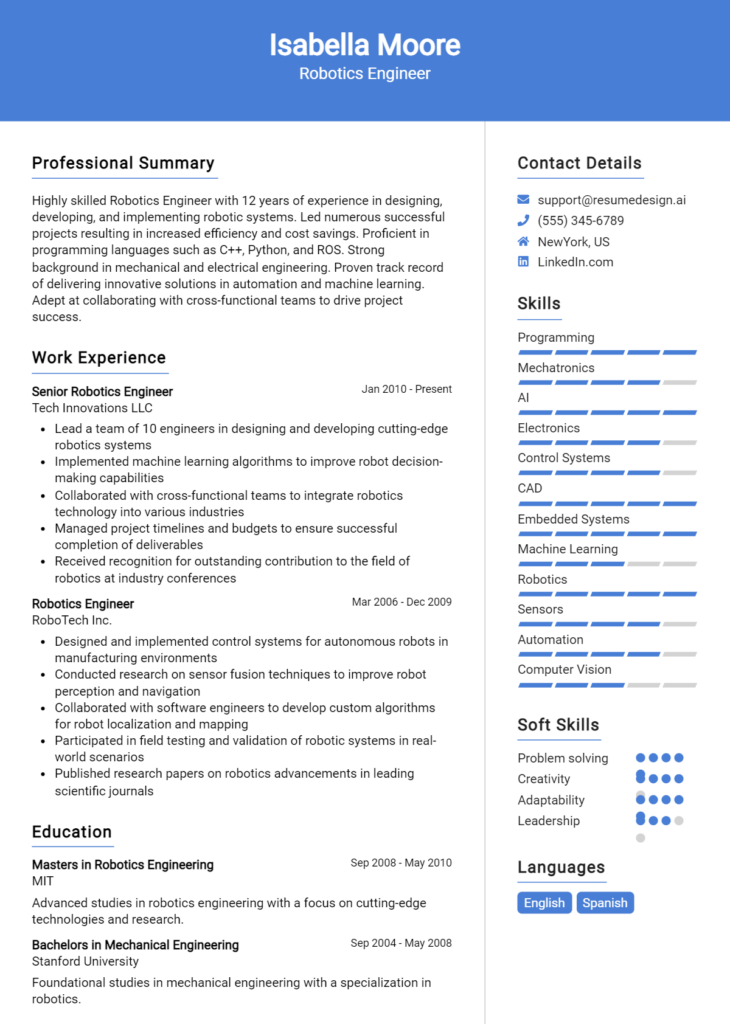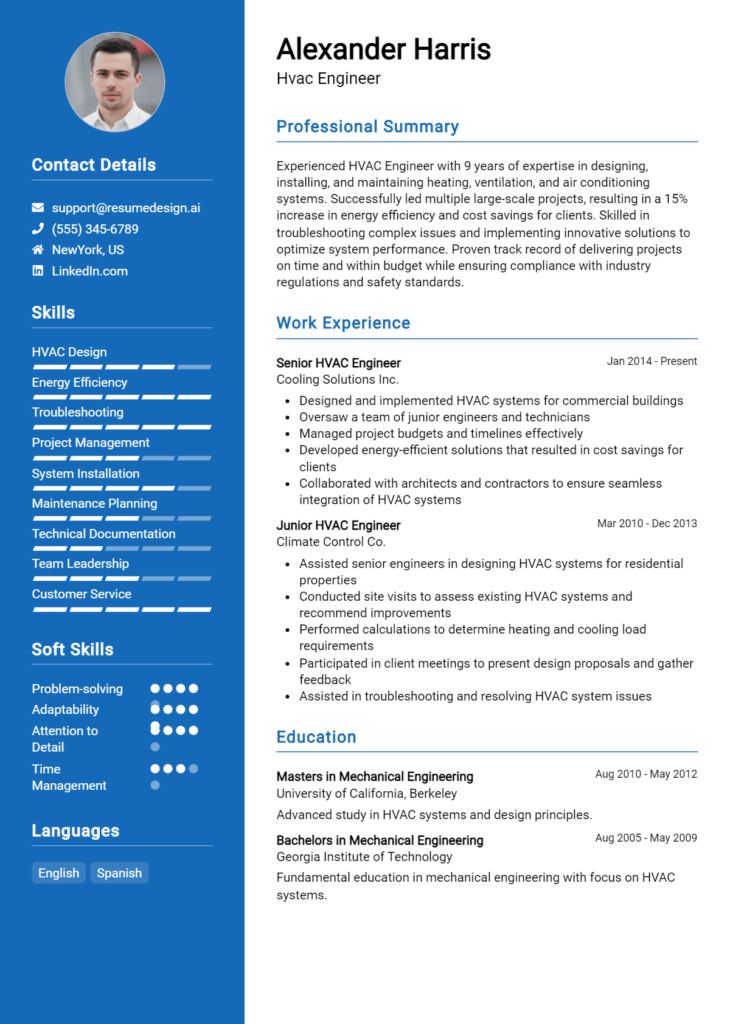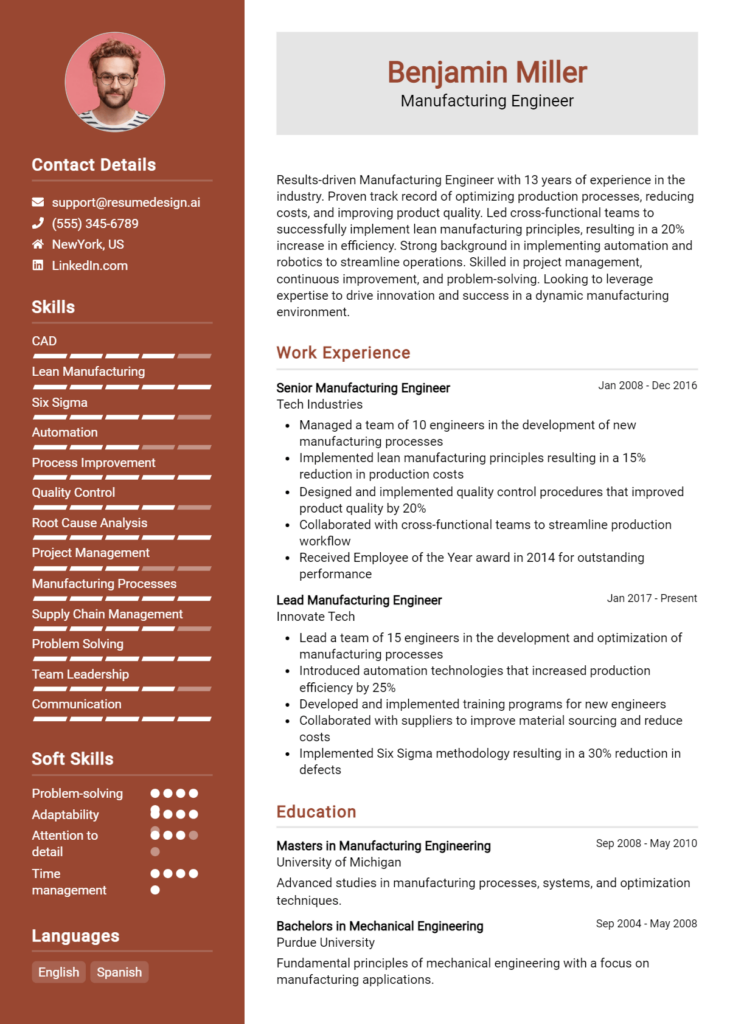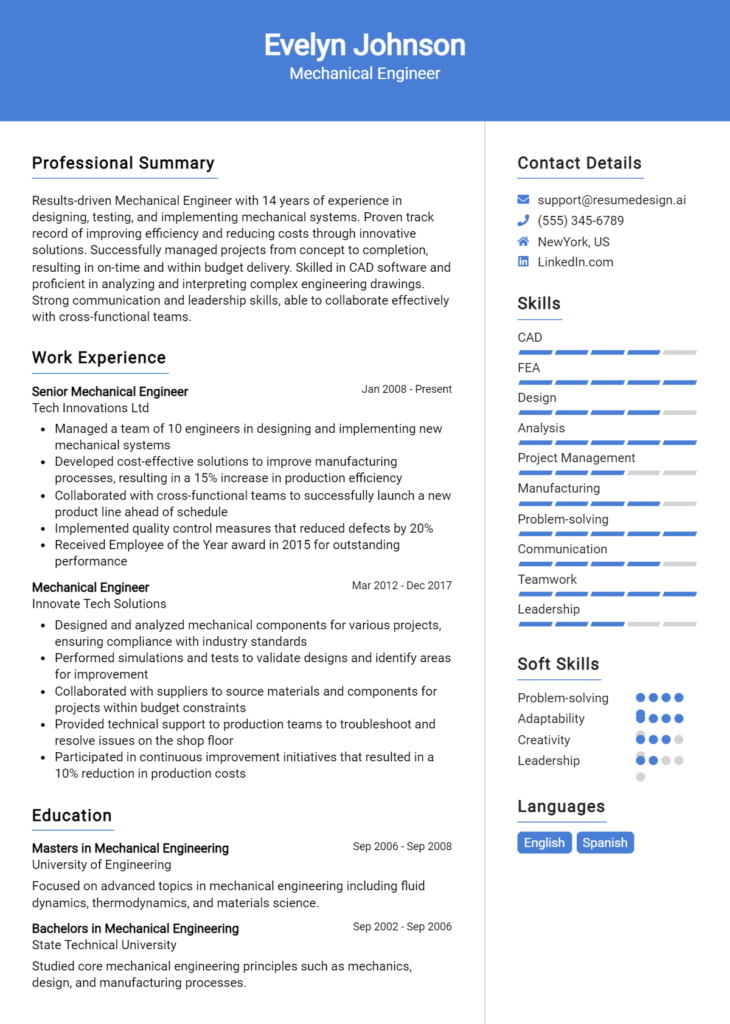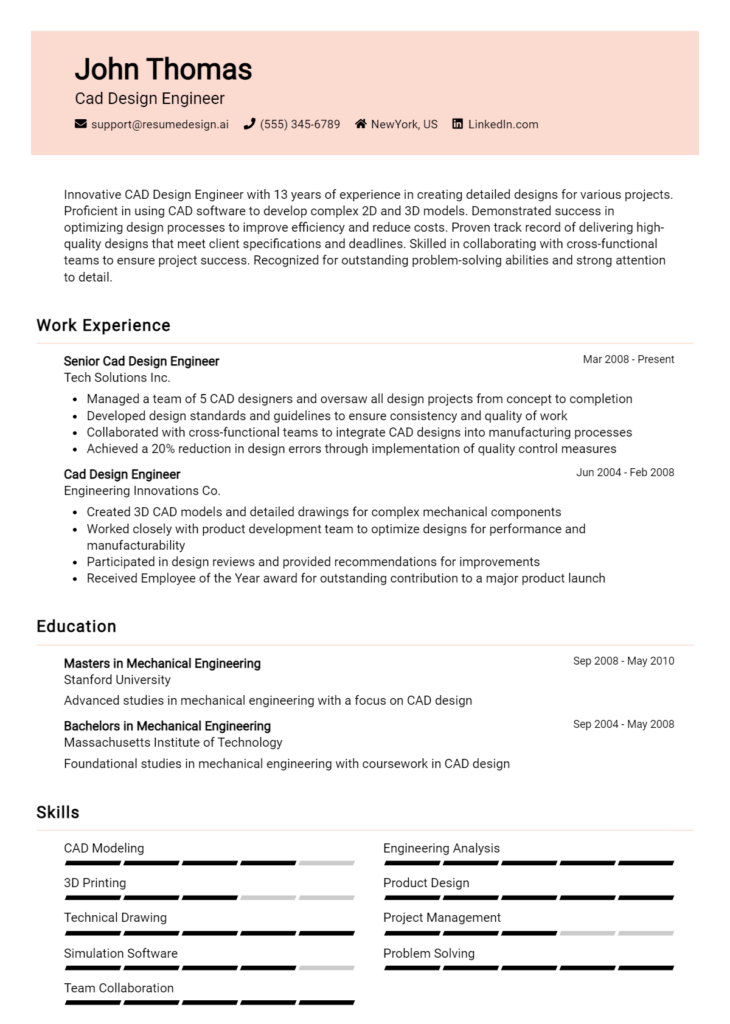Automotive Engineer Core Responsibilities
An Automotive Engineer plays a crucial role in the design, development, and testing of vehicles, requiring a blend of technical knowledge and operational expertise. Key responsibilities include collaborating with various departments such as design, manufacturing, and quality assurance to ensure seamless integration of vehicle systems. Problem-solving and analytical skills are essential for troubleshooting and optimizing performance. A well-structured resume effectively highlights these competencies, demonstrating how they contribute to the organization's overall objectives and innovation in automotive technology.
Common Responsibilities Listed on Automotive Engineer Resume
- Design and develop automotive components and systems.
- Conduct feasibility studies and performance analysis.
- Collaborate with cross-functional teams for project execution.
- Perform testing and validation of prototypes.
- Ensure compliance with safety and regulatory standards.
- Utilize CAD software for vehicle design and modeling.
- Manage project timelines and budgets effectively.
- Provide technical support during manufacturing processes.
- Analyze data to improve vehicle performance and efficiency.
- Conduct root cause analysis for vehicle failures.
- Stay updated on industry trends and advancements.
- Prepare technical reports and documentation for stakeholders.
High-Level Resume Tips for Automotive Engineer Professionals
In the competitive field of automotive engineering, a well-crafted resume is essential for making a strong first impression on potential employers. Your resume serves as your professional introduction, showcasing your skills, experiences, and achievements in a concise format. It not only reflects your technical abilities but also communicates your passion for the automotive industry. A strong resume can be the key to standing out in a crowded job market, helping you to land interviews and, ultimately, your dream job. This guide will provide practical and actionable resume tips specifically tailored for automotive engineer professionals, ensuring that you present yourself in the best possible light.
Top Resume Tips for Automotive Engineer Professionals
- Tailor your resume to each job application by incorporating keywords and phrases from the job description.
- Highlight relevant experience, focusing on positions and projects that align closely with the automotive field.
- Quantify your achievements by including specific metrics, such as cost savings, efficiency improvements, or project timelines.
- Emphasize your technical skills, including software proficiency (e.g., CAD tools) and knowledge of automotive systems.
- Include certifications and professional affiliations that demonstrate your commitment to ongoing education and industry standards.
- Utilize a clean, professional format that makes your resume easy to read and visually appealing.
- Showcase any hands-on experience, such as internships or projects, that demonstrates practical application of your engineering knowledge.
- Incorporate keywords related to industry trends, such as electric vehicles or autonomous driving technology, to show your awareness of current developments.
- Keep your resume concise, ideally one page, while ensuring all critical information is clearly presented.
- Proofread thoroughly to eliminate any errors, as attention to detail is crucial in engineering roles.
By implementing these tips, you can significantly increase your chances of landing a job in the automotive engineering field. A tailored, well-structured resume that highlights your skills and achievements not only captures the attention of hiring managers but also positions you as a strong candidate in a competitive industry. Take the time to refine your resume, and you'll be one step closer to securing your ideal role in automotive engineering.
Why Resume Headlines & Titles are Important for Automotive Engineer
In the competitive field of automotive engineering, a well-crafted resume headline or title is crucial for standing out among numerous applicants. A strong headline can immediately grab the attention of hiring managers by summarizing a candidate's key qualifications in just a few impactful words. This concise and relevant phrase not only highlights the candidate's expertise but also sets the tone for the entire resume, making it clear how their skills align with the job being applied for. A compelling resume headline can serve as a powerful introduction, enticing hiring managers to delve deeper into the applicant's qualifications and experiences.
Best Practices for Crafting Resume Headlines for Automotive Engineer
- Keep it concise: Aim for one impactful sentence or phrase.
- Be role-specific: Tailor your headline to the specific job you are applying for.
- Highlight key strengths: Focus on your most relevant skills or accomplishments.
- Use action-oriented language: Start with strong verbs to convey confidence and capability.
- Incorporate industry keywords: Utilize terms that are relevant to automotive engineering.
- Avoid jargon: Ensure the language is clear and easily understood by all hiring managers.
- Showcase results: If possible, include quantifiable achievements in your headline.
- Be authentic: Ensure that your headline accurately reflects your experience and skills.
Example Resume Headlines for Automotive Engineer
Strong Resume Headlines
Innovative Automotive Engineer with 8+ Years Experience in Electric Vehicle Development
Results-Driven Automotive Engineer Specializing in Advanced Powertrain Technologies
Detail-Oriented Automotive Engineer with Proven Track Record of Reducing Production Costs by 20%
Weak Resume Headlines
Automotive Engineer Seeking Job
Experienced Engineer
Looking for Opportunities in Automotive Field
The strong resume headlines are effective because they clearly convey specific skills, relevant experience, and measurable achievements, making them immediately appealing to hiring managers. In contrast, the weak headlines fail to impress due to their vagueness and lack of specificity, which does not convey a candidate's unique qualifications or potential contributions to the company. By using strong, targeted headlines, candidates can significantly enhance their chances of making a positive first impression.
Writing an Exceptional Automotive Engineer Resume Summary
A well-crafted resume summary is crucial for any Automotive Engineer looking to make a strong impression on hiring managers. This brief introductory paragraph serves as a snapshot of your professional identity, quickly capturing the attention of recruiters by highlighting key skills, relevant experience, and notable accomplishments. A strong summary should be concise and impactful, tailored to reflect the specific requirements of the job being applied for, ultimately setting the tone for the rest of the resume and encouraging hiring managers to delve deeper into your qualifications.
Best Practices for Writing a Automotive Engineer Resume Summary
- Quantify achievements: Use numbers and metrics to demonstrate the impact of your work.
- Focus on relevant skills: Highlight technical skills and software proficiencies that align with the job description.
- Tailor for the job description: Customize your summary to reflect the specific responsibilities and qualifications outlined in the job posting.
- Keep it concise: Aim for 3-5 sentences that deliver maximum information in minimal space.
- Use action verbs: Start sentences with strong action verbs to convey proactivity and effectiveness.
- Showcase industry knowledge: Include any relevant certifications or knowledge of industry standards.
- Highlight problem-solving abilities: Emphasize your ability to identify issues and implement effective solutions.
- Maintain professionalism: Use a formal tone and avoid overly casual language to convey professionalism.
Example Automotive Engineer Resume Summaries
Strong Resume Summaries
Dynamic Automotive Engineer with over 7 years of experience in designing and testing cutting-edge vehicle systems, resulting in a 20% increase in fuel efficiency for hybrid models. Proficient in CAD software and committed to sustainable engineering practices.
Detail-oriented Automotive Engineer specialized in electric vehicle technology, leading a team that developed a battery management system that reduced charging time by 30%. Proven track record of improving production processes and reducing costs by 15% through innovative design solutions.
Accomplished Automotive Engineer with extensive experience in vehicle dynamics and chassis development. Successfully led multiple projects that enhanced vehicle stability, achieving a 10% improvement in consumer satisfaction ratings based on feedback surveys.
Weak Resume Summaries
Automotive Engineer with some experience looking for a job in the automotive industry. I have worked on different projects and have a background in engineering.
Motivated engineer seeking to contribute to a team in the automotive sector. I have a general knowledge of vehicle systems and a degree in engineering.
The examples provided illustrate the stark contrast between strong and weak resume summaries. Strong summaries are characterized by their specificity, quantification of achievements, and relevance to the job role, making them impactful and engaging. Conversely, weak summaries lack detail and measurable outcomes, rendering them vague and generic, which diminishes their effectiveness in capturing the attention of hiring managers.
Work Experience Section for Automotive Engineer Resume
The work experience section of an Automotive Engineer resume is critical as it provides a comprehensive overview of the candidate's practical expertise in the automotive industry. This section not only highlights technical skills but also demonstrates the candidate's ability to manage teams, lead projects, and deliver high-quality automotive products. By quantifying achievements and aligning their experience with industry standards, candidates can effectively showcase their contributions to previous employers and their potential value to future ones.
Best Practices for Automotive Engineer Work Experience
- Focus on technical skills relevant to automotive engineering, such as CAD software, vehicle dynamics, and powertrain design.
- Quantify achievements with specific metrics, such as percentage improvements, cost savings, or production increases.
- Highlight leadership roles and team management experiences that underscore your ability to guide projects and mentor peers.
- Align your work experience with industry standards and best practices to demonstrate your familiarity with current automotive technologies.
- Use action verbs to describe your responsibilities and achievements, making your contributions clear and impactful.
- Include collaborative projects that showcase your ability to work effectively with cross-functional teams.
- Tailor your experience to the job description, emphasizing the most relevant work experiences for the position you are applying for.
- Keep descriptions concise but detailed enough to convey the complexity of projects you have handled.
Example Work Experiences for Automotive Engineer
Strong Experiences
- Led a cross-functional team to redesign a hybrid vehicle powertrain, resulting in a 20% increase in fuel efficiency and a 15% reduction in production costs.
- Developed and implemented a new testing protocol for safety features, achieving compliance with regulatory standards and reducing test time by 30%.
- Managed a project that successfully launched a new electric vehicle model within budget and ahead of schedule, increasing market share by 10% in the first quarter post-launch.
Weak Experiences
- Worked on various automotive projects.
- Helped improve vehicle performance.
- Participated in team meetings to discuss engineering issues.
The examples considered strong demonstrate clear, quantifiable outcomes and specific technical leadership roles, showcasing the candidate's direct contributions to successful projects. In contrast, the weak experiences lack detail and specificity, making them unimpressive and failing to convey the candidate's actual skills or achievements in the automotive engineering field.
Education and Certifications Section for Automotive Engineer Resume
The education and certifications section of an Automotive Engineer's resume is critical, as it showcases the candidate's academic background and specialized training relevant to the field. This section not only highlights formal education such as degrees in mechanical or automotive engineering but also emphasizes industry-relevant certifications and ongoing learning efforts. By including relevant coursework, certifications, and specialized training programs, candidates can significantly enhance their credibility and demonstrate their alignment with the specific requirements of the automotive engineering role they are pursuing. A well-structured education and certifications section can set a candidate apart in a competitive job market.
Best Practices for Automotive Engineer Education and Certifications
- Prioritize relevant degrees and certifications that align with the job description.
- Include the name of the institution, degree obtained, and graduation date.
- List industry-recognized certifications, such as ASE or Six Sigma, prominently.
- Detail relevant coursework that highlights specialized knowledge applicable to the position.
- Highlight ongoing education, such as workshops or online courses, to show commitment to continuous learning.
- Use clear, concise language and organize the section for easy readability.
- Consider the inclusion of GPA if it is notably high and relevant to the position.
- Tailor the section to the specific requirements and preferences of the employer.
Example Education and Certifications for Automotive Engineer
Strong Examples
- Bachelor of Science in Mechanical Engineering, University of Michigan, Graduated May 2022
- Certified Automotive Engineer (CAE), National Institute for Automotive Service Excellence, 2023
- Relevant Coursework: Vehicle Dynamics, Automotive Systems Design, and Engine Performance Optimization
- Master of Engineering in Automotive Engineering, Texas A&M University, Expected Graduation May 2024
Weak Examples
- Associate Degree in General Studies, Community College, 2019
- Certification in Basic Computer Skills, Online Course, 2020
- High School Diploma, Local High School, Graduated 2018
- Certification in AutoCAD Basics, Online Course, 2018
The strong examples listed demonstrate a clear focus on relevant educational achievements and industry-recognized certifications that directly align with the requirements of an Automotive Engineer. They reflect a candidate who is well-prepared and knowledgeable in the automotive field. Conversely, the weak examples reveal qualifications that are either outdated, overly general, or unrelated to the automotive engineering profession, which could undermine the candidate's credibility and relevance for the position they are applying for.
Top Skills & Keywords for Automotive Engineer Resume
In the competitive field of automotive engineering, showcasing the right skills on your resume is crucial for standing out to potential employers. A well-crafted resume not only highlights your technical abilities but also emphasizes your interpersonal strengths, which are equally important in this collaborative industry. The right combination of hard and soft skills can demonstrate your capability to design, develop, and improve automotive systems while effectively communicating and working within a team. By strategically integrating skills into your resume, you can create a compelling narrative of your professional expertise and experience.
Top Hard & Soft Skills for Automotive Engineer
Soft Skills
- Problem-solving
- Team collaboration
- Communication
- Time management
- Adaptability
- Critical thinking
- Attention to detail
- Leadership
- Creativity
- Project management
Hard Skills
- CAD software proficiency (e.g., SolidWorks, AutoCAD)
- Automotive electrical systems knowledge
- Engine performance analysis
- Vehicle dynamics expertise
- Manufacturing processes understanding
- Materials science application
- Data analysis and simulation
- Compliance with safety regulations
- Prototype development
- Testing and quality assurance techniques
By equipping yourself with these essential skills and showcasing them effectively on your resume, you can enhance your work experience and position yourself as a strong candidate in the automotive engineering landscape.
Stand Out with a Winning Automotive Engineer Cover Letter
Dear Hiring Manager,
I am writing to express my interest in the Automotive Engineer position at [Company Name] as advertised on [Job Board/Company Website]. With a Bachelor’s degree in Mechanical Engineering and over five years of hands-on experience in automotive design and development, I am excited about the opportunity to contribute to your innovative team. My background in vehicle dynamics, powertrain systems, and my commitment to sustainable engineering practices align well with the goals of [Company Name].
In my previous role at [Previous Company Name], I successfully led a project focused on enhancing fuel efficiency for a new line of electric vehicles. By utilizing advanced computational fluid dynamics (CFD) and collaborating with cross-functional teams, we achieved a 15% improvement in aerodynamics, which significantly contributed to the vehicle's market competitiveness. My ability to analyze complex systems and implement effective design changes allows me to deliver results that meet both performance and sustainability objectives.
I am particularly drawn to [Company Name] because of its commitment to innovation and excellence in the automotive industry. I am eager to bring my expertise in CAD software, project management, and regulatory compliance to your team. Furthermore, my strong communication skills enable me to effectively convey technical information to non-technical stakeholders, ensuring that project timelines and expectations are met with clarity and precision.
Thank you for considering my application. I look forward to the opportunity to discuss how my skills and experiences can contribute to the ongoing success of [Company Name]. Please feel free to contact me at your earliest convenience to schedule a conversation.
Sincerely,
[Your Name]
[Your Phone Number]
[Your Email Address]
Common Mistakes to Avoid in a Automotive Engineer Resume
When crafting a resume for an automotive engineer position, it's essential to present your skills and experience effectively to stand out in a competitive field. However, many candidates make common mistakes that can detract from their qualifications and hinder their chances of landing an interview. By avoiding these pitfalls, you can create a more compelling resume that accurately reflects your capabilities and experiences.
Lack of Tailoring: Failing to customize your resume for the specific job can make it seem generic and unappealing. Always align your skills and experiences with the requirements of the position you’re applying for.
Overloading with Technical Jargon: While technical skills are crucial, using too much jargon can alienate hiring managers who may not be familiar with every term. Aim for a balance of technical language and clarity.
Ignoring Soft Skills: Automotive engineering isn't just about technical expertise; soft skills like teamwork, communication, and problem-solving are equally important. Neglecting to highlight these can give an incomplete picture of your capabilities.
Inconsistent Formatting: A cluttered or inconsistent format can make your resume hard to read. Ensure uniformity in font sizes, bullet points, and spacing to create a polished look.
Vague Job Descriptions: Providing vague descriptions of past roles can leave hiring managers with questions about your actual contributions. Use specific metrics and examples to demonstrate your achievements.
Neglecting Relevant Certifications: In a rapidly evolving industry, certifications can set you apart. Make sure to include any relevant certifications or licenses that enhance your qualifications.
Including Irrelevant Experience: Listing unrelated work experience can dilute your resume's impact. Focus on experiences that directly relate to automotive engineering or showcase transferable skills.
Errors and Typos: Spelling mistakes or grammatical errors can create a negative impression and signal a lack of attention to detail. Always proofread your resume multiple times before submission.
Conclusion
As we explored the essential skills and qualifications required for an Automotive Engineer, it is clear that a strong foundation in engineering principles, proficiency in automotive design software, and a deep understanding of vehicle systems are crucial for success in this role. Additionally, soft skills such as teamwork, problem-solving, and effective communication are equally important in collaborating with multidisciplinary teams and ensuring successful project outcomes.
We also highlighted the importance of staying updated with industry trends and advancements, as the automotive sector continues to evolve with the integration of new technologies such as electric vehicles and autonomous driving systems.
Now that you have a clearer understanding of what it takes to be an Automotive Engineer, it's time to reflect on your own qualifications and ensure your resume effectively showcases your skills and experiences. We encourage you to take advantage of the various resources available to you, including resume templates, which can help you create a visually appealing and professional layout.
Additionally, consider using the resume builder for a more tailored approach to crafting your resume based on your specific experience and the automotive engineering role you are targeting. You can also review resume examples to gain inspiration and see how others in the field present their qualifications.
Don't forget to complement your resume with a compelling cover letter; our cover letter templates can guide you in presenting your narrative effectively. Take action today and refine your Automotive Engineer resume to stand out in this competitive field!

